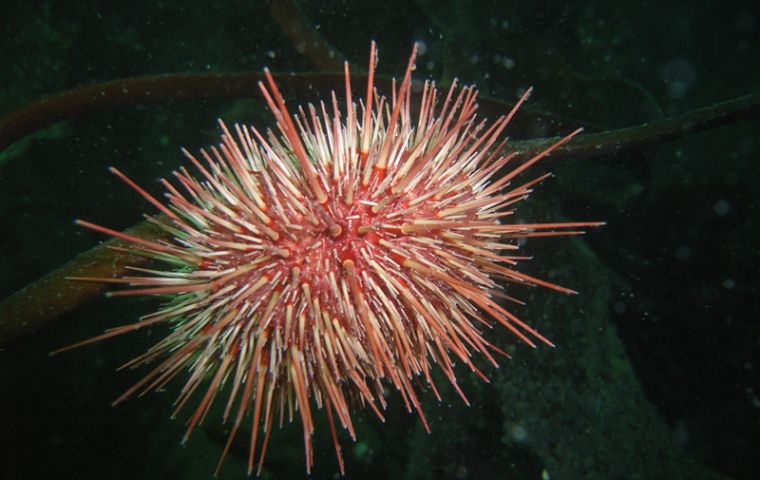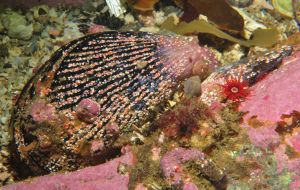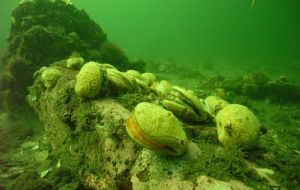MercoPress. South Atlantic News Agency
Falklands explore potential for small-scale commercial fishery with 20 focal species
 Chilean urchin - Loxechinus albus (|Pic: SMSG)
Chilean urchin - Loxechinus albus (|Pic: SMSG)  Ribbed mussel -Processing Aulacomya ater (Pic Jamie Simpson)
Ribbed mussel -Processing Aulacomya ater (Pic Jamie Simpson)  Patagonian scallops - Zygochlamys patagonica (Pic Deborah Davidson)
Patagonian scallops - Zygochlamys patagonica (Pic Deborah Davidson) By Dr. Deborah Davidson - The South Atlantic Environmental Research Institute (SAERI) has been established since March 2012, and already has an expanding team of 12 employees based in Stanley (one of whom is a PhD student), five international PhD students, and three employees based in Ascension Island and one working in Saint Helena - all on various projects.
One such project is the Inshore Fisheries Research project, funded by the Falkland Islands Government’s Economic Development Strategy, which aims to determine the potential for a small-scale commercial fishery on certain inshore marine species and to fill some gaps in our knowledge-base of the inshore marine environment, of the Falkland Islands.
The project is investigating the distribution, abundance, age, growth and reproduction of almost 20 focal species, in order to determine whether the species are present in large enough quantities and have life histories that will enable them to be fished sustainably. This is being conducted in partnership with the Fisheries Department (FIFD) and the Shallow Marine Surveys Group (SMSG): a group of volunteer divers and scientists who dive on a weekly basis, when possible, and record species and habitats within each location. The group collects samples of the target species and the Project Manager, Dr Deborah Davidson, processes the specimens in the lab to determine their age, growth, maturity and fecundity, and when each species are likely to spawn. These life history parameters are crucial information for stock assessment and fisheries management.
Within the winter months, these weekly collections have been restricted to within the vicinity of Port William and Berkeley Sound. However, given that the Falkland Islands have such a vast coastline, a wider distribution of sampling effort is also needed.
Therefore, a team of SAERI, Fisheries and SMSG team members took part in a 10 day research cruise onboard the RV Hans Hansson from August 7 to 17. The cruise was conducted around Weddell Island, Beaver Island and New Island . Despite being struck by bad weather for most of the cruise, in a total of seven dive days the divers (Dr Paul Brickle, Dr Paul Brewin, Joost Pompert, Stevie Cartwright, Jamie Simpson, Dion Poncet and Juliette Hennequin) assessed the habitat and species present at each dive site, took photos for later analyses and collected specimens of the candidate species for the “ship-side team” (Debs Davidson and Emily Hancox) to process.
Samples have also been taken back to shore for analyses in the lab. Primarily, lots of Chilean sea urchins (Loxechinus albus) and ribbed mussels (Aulacomya ater) were found, both of which are heavily exploited in Chile. The team also found two new scallop (Zygochlamys patagonica) beds which, depending on further research, could prove fruitful for future fisheries.
As well as conducting dive surveys, the team also performed plankton trawls during the night or early morning to determine what animal plankton species are present in the waters of the area. Water characteristics (salinity and temperature at depth of the seawater) were measured at each dive site and on the final two days of the cruise a string of these samples were taken in Queen Charlotte Bay and in Falkland Sound to determine the salinity, temperature and depth profile of the areas.
These data can be used to determine what environmental preferences each species has, and will allow us to predict what species will be present in an area, based on both habitat type and environmental factors. Drop down cameras were also deployed from the vessel at each of the water sample stations in the final two days, and the footage recorded for analysis. This comparatively quick method of data collection at each location will allow comparisons to be made on the habitats and species present, and relate these to the respective water characteristics of each.
This cruise is the most up-to-date and detailed survey on potential inshore fisheries resources in the area, and has certainly set the precedent for future inshore fisheries research cruises. Excellent, detailed information and data were collected during the research cruise.
With all this exciting new data we will be able to predict the probability of commercial species presence in un-sampled areas. However, none of this would have been possible without the help of all involved.
Thanks to FIFD and to Paul Ellis for the use of their equipment and to the team for all of their effort, help and support. Thanks also to the captain and mate Dion Poncet and Juliette Hennequin for all of their hard work and the use of the Hans Hansson, which proved to be an excellent platform for this research cruise. (Penguin News).-



Top Comments
Disclaimer & comment rules-

-

-

Read all commentsSounds good, lets hope it all works out for them,
Sep 11th, 2014 - 01:00 pm 0just don't let you know who know,
or she will go screaming to the UN.
Did they find any Stealth Penguins? Slippery fellows, those Stealth Penguins!
Sep 11th, 2014 - 01:20 pm 0:)
------------
On a serious note, it's great to see this sort of important research carried out by an international team.
The Falkland Islanders leading the way.
Well worn the time, effort and budget. Just the Sea Urchins are worth a fortune. Here in Chile it's a delicacy, but in Japan is as expensive as caviar. They buy enormous quantities from Chile each year. If you can cultivate Abalone, Oysters and Scallops... There is an amazing potential...
Sep 11th, 2014 - 04:05 pm 0Commenting for this story is now closed.
If you have a Facebook account, become a fan and comment on our Facebook Page!